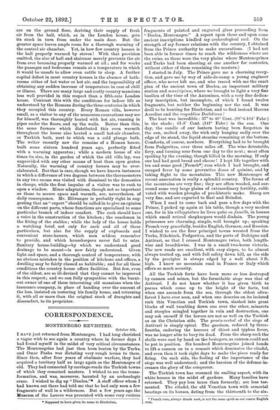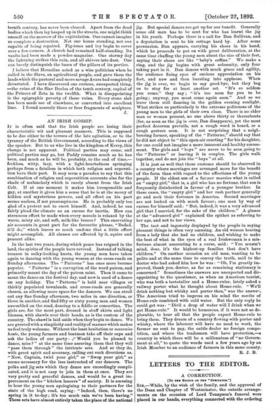CORRESPONDENCE.
MONTENEGRO REVISITED.
October 8th. I HAVE just returned from Montenegro. I had long cherished a vague wish to see again a country where in former days I had found myself in the midst of very critical circumstances. The Montenegrins had just then been beaten by the Turks, and Omar Pasha was dictating very rough terms to them. -Since then, after four years of obstinate warfare, they had acquired a territory half as large again as the Montenegro of .old. They had connected by carriage-roads the Turkish towns of which they remained masters. I wished to see the trans- formation, and was, moreover, haunted by an archmologic craze. I wished to dig up "Dioclea."* A staff officer whom I had known out there had told me that he had only seen a few fragments of wall in a wilderness. But a few years ago the Museum of the Louvre was presented with some very curious
• Supposed to have given its name to Diocletian.
fragments of painted and engraved glass proceeding from " Doclea, Montenegro." A report upon these and upon some
ancient inscriptions kindled my archEeological zeal. On the strength of my former relations with the country, I obtained
from the Prince authority to make excavations. (I had not been able in former times to reach the wilderness where are the ruins, as these were the very plains where Aiontenegrines and Turks had been shooting at one another for centuries, without either of them remaining the masters.)
I started in July. The Prince gave me a charming recep- tion, and gave me by way of aide-de-camp a young engineer
officer, who never left me, and who traced with me the exact plan of the ancient town of Doclea, an important military station and municipium, where we brought to light a very fine basilica of the time of the Antonines, with a very fine dedica- tory inscription, but incomplete, of which I found twelve fragments, but neither the beginning nor the end. It was droll to be hunting for Diocletian, and to find instead Marcus Aurelius and the respublica Docletiana
The heat was incredible : 370 to 40° Cent. (984-104° Fahr.) in the shade ; 61-3° Cent. (141° Fahr.) in the sun. One
day, the candle of our lantern having been forgotten in the sun, melted away, the wick only banging sadly over the edge of its stand, the liquid stearine remaining at the bottom.
Comforts, of course, nowhere. Everything had to be brought from Podgoritza, over three miles off. The wine detestable, fiery, and turning sour from one day to the next ; meat often spoiling by the evening, though killed in the morning. If only
one had had good bread and cheese ! I kept life together with tea and some good [French*] rum which I had brought, and
escaped fever by some preventive doses of quinine, and by
taking flight to the mountains. This new Montenegro of recent annexation is really a splendid country. The forms of
the mountains are very fine ; they are often wooded, and sur- round some very large plains of extraordinary fertility, culti- vated with wooden ploughs of pre-historic make. Sheep are very fine, and are exported to Bari and Brindisi.
When I used to come back and pass a few days with the Prince, I picked up again at his table, though a very modest one, for in his villeggiature he lives quite en famille, in houses which small retired shopkeepers would disdain. The young princesses are charming, simple, well brought up ; speaking French very gracefully, besides English, German, and Russian.
I wished to see the four principal towns wrested from the Turks, Nikchisch, Podgoritza, and the ports of Dakigno and Antivari, so that I crossed Montenegro twice, both length- wise and breadthwise. I was in a small two-horse victoria. The new roads are excellent, with easy slopes, to be almost always trotted up, and with full safety down hill, as the side by the precipice is always edged by a wall about 3 ft. high. I know no mountain road in France or Italy which offers so much security.
All the Turkish forts have been more or less destroyed by cannon and mines, but the formidable siege was that of Antivari. I do not know whether it has given birth to poems which come up to the height of the facts, but when one ascends from the sea, through the oldest olive- forest I have ever seen, and when one descries on its isolated rock this Venetian and Turkish town, slashed into great blocks of wall tumbling down one over the other, minarets and steeples mingled together in ruin and destruction, one may ask oneself if the heroes are not as well on the Turkish as on the Christian side. The proces-verbal of the siege of Antivari is simply epical. The garrison, reduced by three- fourths, enduring the horrors of thirst and typhus fever, was no longer able to bury its dead. From the sharp rock the shells were cast by hand on the besiegers, as cannon could not be put in position. Six hundred Montenegrins joined hands to lift a cannon on to a summit which dominates the citadel, and even then it took eight days to make the piece ready for firing. On each side, the feeling of the importance of the siege was well understood; and the heroism of the defence in- creases the glory of the conqueror.
The Turkish town has resumed its smiling aspect, with its white houses in the midst of gardens. Many families have returned. They pay less taxes than formerly; are less tor- mented. The citadel, the old Venetian town with armorial bearings on its houses, dating from the thirteenth to the six-
* French rum, always drank neat, is not the same spirit as our coarse English ru
teenth century, has never been cleared. Apart from the dead bodies which then lay heaped up in the streets, one might think oneself on the morrow of the capitulation. One cannot imagine so complete a destruction. Not one house standing, not one capable of being repaired. Fig-trees and ivy begin to cover over a few corners. A church had remained half-standing. Its vaults had been made a powder-magazine. One stormy day the lightning strikes this ruin, and all shivers into dust. One can barely distinguish the bases of the pillars of its portico.
I believe that Hera°lius acted as a wise politician when he called in the Slays, an agricultural people, and gave them the lands which the pastoral and more savageAvars had completely devastated. I have discovered one curious, unexpected thing, —the ruins of the Slav Doclea of the tenth century, capital of the Princes of Zeta in the twelfth. What is disappointing is the epigraphic poverty of these ruins. Every stone slab has been made use of elsewhere, or converted into excellent lime. I found scarcely three or four fragments of sculpture.
J.







































 Previous page
Previous page